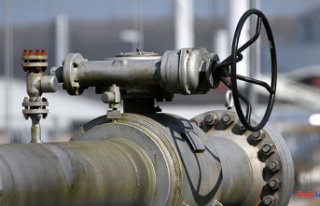They should make agriculture much more environmentally and climate-friendly: The subsidies that the EU pays a farmer if he does more for the soil, water, climate and biodiversity in his fields. More diverse crop rotations, more grassland, more fallow land, more hedges should be created. Since 2014, around 1.5 billion euros have flowed to companies in Germany alone.
Eight years later, a study by the Thünen Institute in Braunschweig on behalf of the Federal Environment Agency came to a sobering conclusion: the eco-subsidies have hardly done anything for the environment and climate. Study director Norbert Röder explains why this is - and what should happen instead.
WORLD: What have the EU’s eco-premiums actually achieved?
Norbert Röder: Not very much. There are a little more fallow land, but the humus content in the arable land has probably increased and the nutrient surplus has fallen slightly. The general negative trend, according to which the environment had previously been continuously going downhill, was also halted. But we still have too high nitrate levels in the groundwater, and the use of pesticides is still very high. Erosion has even increased in some places because, for example, corn was suddenly being mined in places at risk of erosion. So the funds have not achieved anywhere near what they could have achieved.
WORLD: Why is that?
Röder: In the Common Agricultural Policy, CAP for short, attempts have been made to ensure more environmental protection and nature conservation throughout the EU from the Arctic Circle to Sicily with very general requirements. These requirements must be implemented by the companies if they want to continue to receive EU funding. In some areas, however, the farmer can choose from many measures. He then usually does not choose what works best in the natural environment. But what is easiest to implement or most worthwhile for him.
WORLD: What does that mean exactly?
Röder: However, this means that most farms can be farmed as before without any actual improvements. Farmers were suddenly rewarded for measures they were already carrying out. Many others, who really needed more environmental protection, did not even apply for the funds because they were not economically interesting.
WORLD: Do you have an example?
Röder: For example, funding for more variety of crops: In order to receive the premium for this, larger farms must cultivate at least three crops, none of which may take up more than 75 percent of the arable land. However, most farms in Germany were already growing more crops in order to spread the risk of cultivation. Now they suddenly got money for it without providing any additional service for the environment or the climate. For other companies, however, the eco-premium for more types of crops is hardly worthwhile because other crops mean losses that the premium cannot compensate for. Or in wine or vegetable cultivation, where sales of several tens of thousands of euros are often achieved per hectare. 300 euros of CAP funding per hectare does not induce anyone to adapt to organic rules.
WORLD: Slightly improved soil, more fallow land - aren't these successes worth the money?
Röder: At what price did you buy these things? For cover crops, for example, which are planted between two harvests and are primarily intended to improve the soil, farmers were unrestrainedly overpaid. Growing them costs relatively little. However, he receives a significantly higher subsidy for them and thus profits than if he were to leave part of his area fallow, for example. Then, of course, the farmer says, especially in regions with intensive farming, "Nope, I don't do fallow land." But fallow land brings a lot more to biodiversity than catch crops. In places where the most intensive agriculture is practiced, the incentives for more eco-friendly measures have not even been introduced. Ultimately, in the last few years, funding items in particular have been shifted between budgets.
WORLD: To what extent?
Röder: Money was transferred from the pot that was actually supposed to be used to promote more demanding ecological measures such as the rewetting of moors or the cultivation of nutrient-poor grassland into the pot from which farmers were previously directly subsidized without any special environmental regulations. These previously unconditional direct payments have now been given a green cloak by only paying them under certain conditions. In the end, I was actually pleasantly surprised by what happened. Unfortunately, the farmer who does something for biodiversity is currently often the fool.
WORLD: Ah?
Röder: With the currently mostly negative trends, it is foreseeable that those who have been concerned about the biodiversity on their land will at some point be required to conserve those species that still occur on their land. He must then restrict his management accordingly. On the other hand, someone who has sprayed and plowed everything away “in good time” can continue to work in peace.
WORLD: How could you achieve more for the environment?
Röder: For example, a minimum percentage of fallow land could be made mandatory. If you still want to leave the fallow land and other measures completely voluntary, you could adjust the funding amounts at least regionally to the costs incurred. It would also be worthwhile for a farmer in the intensively cultivated Vechta-Cloppenburg to leave part of his land fallow. But the one in Brandenburg with his sand box wouldn't laugh up his sleeve at how much he gets for an area that he wouldn't farm anyway. Less money for catch crops and regionally adapted support for fallow land would therefore be much smarter.
WORLD: New rules for agricultural subsidies are to apply from 2023. Did you learn from the mistakes?
Röder: In principle yes. Farms in Germany, for example, should only receive funding if they grow at least five crops and none of them on more than 30 percent of their area. In view of the currently high prices for agricultural products, however, the question arises: will the companies take advantage of the subsidies at all? Actually, we would have to reduce the intensity overall in the areas in order to solve our environmental problems. However, high prices encourage farmers to produce more. Like many entrepreneurs, they are often profit maximizers.
WORLD: More environmental protection, although high profits are tempting. How do you get out of the dilemma?
Röder: By either increasing the mandatory rules or funding for voluntary measures. The latter are only implemented if the farmer can earn more money with them than with the food that he would have grown instead of flower strips or fallow land.
WORLD: Many farmers say that the prices for agricultural products have to rise so that more environmentally friendly farming can be afforded.
Röder: Higher prices only lead to more environmental protection if the maximum intensity of farming is stipulated. But then you have to prevent agriculture from migrating to non-EU countries with lower standards and costs. Similar to what the European Commission is proposing for CO₂, there should also be a certain environmental surcharge on products from non-EU countries for agricultural products.
WORLD: Farmers in the Netherlands and Germany are already taking to the streets again to protest against environmental regulations. What do you tell them?
Röder: It's all about the animal population. They have been promoted for decades, at the expense of the environment and climate. Now there has to be a clear reduction here. As a result, there will, to be honest, be fewer farmers. These are massive existential worries, as they also arise with other plant closures. Added to this are the expensive machines and buildings, which are written off over 15 to 20 years and some of which become worthless overnight. The long-term prospects must now be shown so that everyone can plan.
dr Norbert Röder is an agricultural economist at the Thünen Institute for Living Conditions in Rural Areas in Braunschweig. There he leads a working group that deals with the effects of agricultural policy measures. He also advises various institutions at European, national and regional level.












